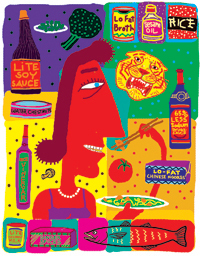 EVOLVE IN 5 STEPS
EVOLVE IN 5 STEPS
Fluffing your
culinary ego
BY MELISSA GIBSON
I'll be candid: I never anticipated that my livelihood would revolve around knowing the most strategic way to braise meat, what sugars make the best caramelized onions or how to tell the difference between a paring knife and a chef's knife. However, I spent much of 2007 cultivating my culinary vernacular while researching my first book, The Little Black Apron: A Single Girlís Guide to Cooking with Style & Grace(Adams Media, 2007).
While my co-authors, Jodi Citrin Greebel (nutritionist) and Katie Nuanes (chef) are wizards in their respective domestic arenas, I only recently began learning (and wanting to learn) about my kitchen and cooking. To be completely honest, I'm partial to dinners consisting of a glass of wine, a bowl of pistachios and a few slices of cheese. However, given the nutritionally devoid war zone I called my body, it has become poignantly clear that I should learn how to nourish myself.
To avoid a life based on takeout, I embraced the following five measures.
• Plan ahead. Grocery shop once a week for your staple items. Sit down (on the weekend when you have more time) and create two or three menus for your weeknight dinners. You'll be more apt to cook dinner when you get home if the ingredients are at your beck and call. Many items, even fresh fruits and vegetables, maintain their shelf life over four to five days, so don't shy away from purchasing them in advance. (Fish, on the other hand, should be eaten on the day it's purchased.)
• Stock up. Fill your pantry with basic items that can be leveraged in a pinch should you lack the culinary motivation to be inspired by cooking when you get home. You know: oils, spices, vinegars, flour, sugar that kind of thing.
• Explore and spice up your life. Take rice: While we all LOVE our white rice, it's doing absolutely nothing for our muffin tops and love handles. Wild rice, brown rice and long-grain rice are much higher in fiber and lower in calories and equally tasty. (OK, not at first, but over time.)
• A friend's mother once said, If you can read, you can cook, and I wholeheartedly agree. However, I'll add this caveat: When beginning your culinary education, treat it as you would firstgrade reading. You didn't start out your literary exploration with Chaucer, or Kafka. You began with See Spot Runand Green Eggs and Ham. The same goes for cooking: Begin with the basics not just techniques, but ingredients. Hone your expertise on dishes you know and love say, mahi mahi in a simple lemon, wine and butter sauce, or a M noa lettuce salad with Kahuku tomatoes and Big Island goat cheese. Don't crush your ego by attempting pomegranate-infused duck with a wine sauce.
• Don't be afraid. Most single people don't know anything about kitchen tools or ingredients but we can learn. If you have an understanding of basic vernacular and the right tools, you're more apt to succeed. In spite of your failures, you will inevitably become a better chef. With time and practice, you will evolve.




